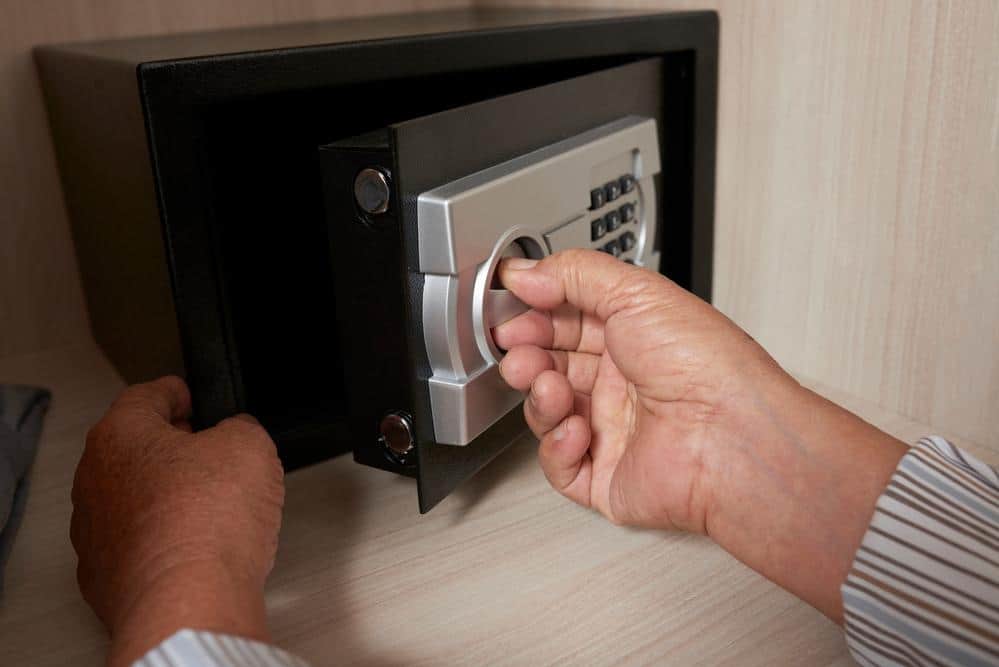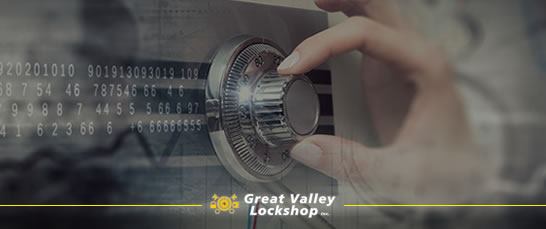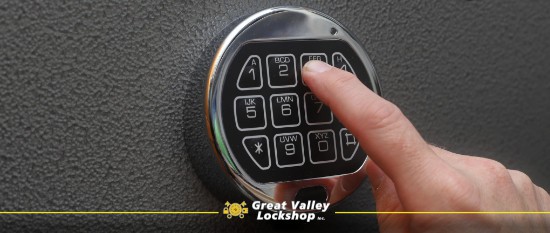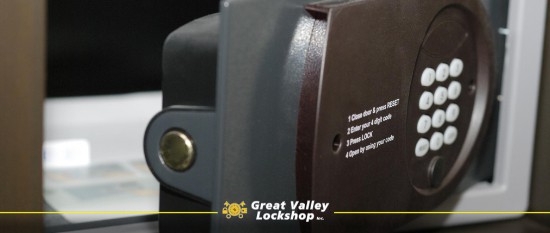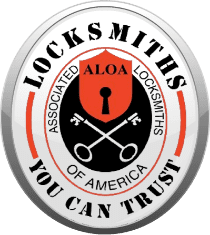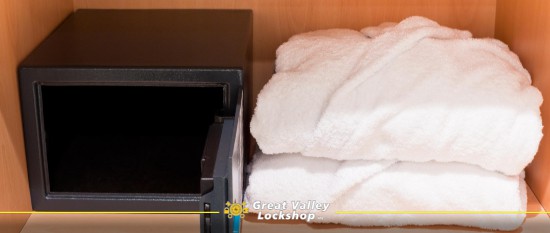
Are Your Valuables Secure in a Hotel Safe?
The typical safe in a hotel room may not be the most secure place to keep your money, jewelry, documents, or electronics. However, the security vulnerabilities of hotel safes are not related to the construction or quality of steel. They are connected to how the safe is installed and who has access to it.
Generally, the electronic safes provided meet fire and burglary resistance standards, and you can easily check this by looking at the UL label displayed on the safe model. Despite this, there are several ways that electronic safes can become vulnerable to theft.
This article will explain why hotel safes can never be 100% safe. We also discuss how hotel administrators like you can ensure the safety of your customer’s belongings.
So, why should guest travelers beware when entrusting their valuables to the safe in their hotel room?
Key Takeaways
- Safes are common hotel equipment that provides guests a place to secure valuables when leaving their room.
- Not all hotel safes are 100% secure from vulnerabilities. Some hotel room safes can be easily accessed with a master key or keycard.
- Consult with Great Valley Lockshop to understand how to improve your overall security.
How Do Hotel Safes Work?
Hotel safes are designed to provide guests with a secure place to store their cash and other valuables while staying in a hotel. Hotel safes work differently depending on the model and type.
The most common type of hotel safe nowadays is battery-powered and uses an electronic keypad for user interaction. Guests typically set their code upon using the safe. This code is only known by the guest.
If a guest forgets the code they enter, a mechanical key or master code is available to override the set code. The master code and key are usually only available to hotel managers for safety.
Some modern hotel room safes come equipped with an audit trail feature. This feature records the history of safe usage, including when it was opened and closed and by whom.
Are Hotel Safes Safe?
While hotel room safes offer a convenient solution for safekeeping valuables, hotel safes are not 100% secure.
Hotel safes are not entirely secure because guests are not the only ones with access to the safe. Hotel staff in charge of rooms or managers can override the lock combination with a master key or code.
Another common reason why hotel safes can be unsecured is that they are primarily placed in an obvious location. Hotel room safes are usually placed inside cabinets.
To ensure safety using a hotel safe, extra precautions must be exercised.
Why Are Hotel Room Safe Locks Often Unsecured?
After checking in, you lock your things inside the safe with a code. One thing that can instantly ruin your vacation is when you swipe the keycard to your room and return to a locked but empty safe.
Hotel room safe locks are not the most secure safety deposits. This equipment has certain drawbacks that can put customers’ belongings at risk.
Below, we discuss some critical issues when using a hotel safe lock.
1. Easy Access
What most hotel guests don’t know is that the electronic safes in the building have a master code that gives hospitality staff the ability to open each one. Some models also have a keyed master lock that allows any keyholder to open it up and access the safe’s contents.
Although this feature is added to access the safe in case a guest forgets their code, it also becomes a safety disadvantage. Even a professional locksmith can open the safe with special tools.
According to Mike Moske, a certified lodging security director and private investigator with 25 years of experience managing hotel and resort security, “the staff perpetrates 60 to 70% of hotel theft and not someone from outside.” He says this is because of easy access; “staff already have access to your room, so employees also have access to the safe.”
2. Opened on Command
With most electronic safes in hotels, guests can choose their own security code. But what happens if you forget that code? What if someone pretends they are the owner of the items in the safe and he/she claims to be locked out?
If a stranger informs the front desk that they need assistance opening the safe in your room, they will likely send a maintenance technician to help. In seconds, the staff can open the safe by punching in the master code. If employees do not request to see the guest’s identification before opening the safe, this could mean that the contents have just been handed over to the wrong person.
3. Weak Master Code Practices
Hotel employees don’t need to know the code you set when locking your items in the safe. They have a master code as a backup. However, this presents another potential security issue when hotel staff use the master code within sight of guests and others. This same master key code can be used to break into virtually every safe in the hotel facility.
If a hotel does not have enough security to protect the master code, anyone can access the safe.
4. Relying on the Original Override Code
Data security specialists point out another problem. When initially purchased, safes come with an override code—usually 0000 or 9999. However, it depends on the hotel manager to change the manufacturer’s override code, and many do not.
We also know that these factory settings can be found on the internet and used by hackers to organize a heist. The lack of more advanced security or encryption can be a critical weakness for safes.
5. Multiple Modes of Entry
Depending on the model of the safe, hotel managers likely have more than one master key system. They may have a traditional keyed entry or magnetic access card that works as a backup to unlock safes. Anybody with these three things can open any safe in the hotel.
6. Faulty Installation
If the safes are not installed correctly, it may create vulnerabilities that someone with malicious intent can exploit.
What’s the point of locking your valuables in a steel safe if the whole unit can be picked up and stolen? Upon closer inspection, many hotel safes are attached to closets using wood screws or bolts that can be unscrewed.
This makes it easy for someone to remove the entire safe from the room. Other hotels may install safes into nightstands or smaller pieces of furniture that a thief can remove from the room.
Consider these factors when changing security locks for your hotel.
It is important to note that not all hotel room safes have the same issues. Some may even be more advanced and lack any of the mentioned issues. It is always a great practice for hotel staff to update their security system features and provide an extra layer of safety.
Learn how you can improve your hotel security with the help of Great Valley Lockshop!
How to Secure a Hotel Safe Lock?
While there are undeniable limitations to the security offered by hotel safes, hotel administrators can implement certain precautions to protect your customer’s belongings.
Here are some effective ways to ensure the safety of your customer’s belongings in your hotel safe:
- Hotel managers must change the factory override of the safes installed in the building to a unique code. This can be done regularly as a maintenance measure to ensure safety.
- A professional should install safes. The equipment should be fixed to a solid part of the structure using heavy-duty bolts.
- Hotel staff should be required to see the ID and confirm that it matches the registered guests of that room before opening a locked safe with the master key.
- When entering the master code into the keypad, they must ensure that it’s not visible to others.
- Backup keys and access cards should be kept in a secure location in the hotel and only accessed by authorized staff.
- Hotel managers must consider investing in more advanced, safe technology. Some hotel safes have secure encryption features and anti-tamper mechanisms. You can also install cameras dedicated to protecting the safe and accessing the video in case of a break-in.
- All staff must be trained thoroughly on safe use protocols.
- All staff with access to master codes and keys must be heavily recorded.
- Conduct regular audits to address potential vulnerabilities.
- Communicate with the safe supplier to understand what improvements can be implemented for your hotel.
By implementing these measures, hotels can provide guests with a secure and comfortable environment. These practices also show your hotel’s commitment to security and compliance with the highest security standards.
You can also take security to the next step by choosing the proper door locks for hotel and hospitality security.
Secure Commercial Safe in Your Hotels with Professional Locksmith Services
Great Valley Lockshop provides security consultations for hotels and other commercial buildings regarding fire and burglary safes, doors, locks, and emergency hardware.
Our team can help you identify which security measures and equipment will provide you with the most efficient security for your guests. Learn about our master keying services and high-security locks.
